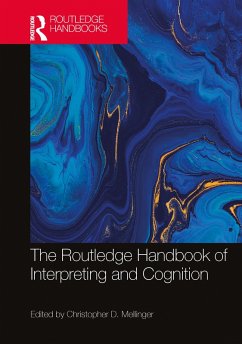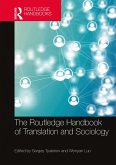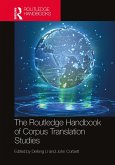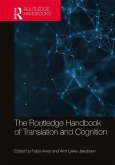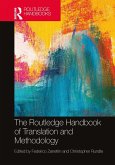The Routledge Handbook of Interpreting and Cognition (eBook, PDF)
Redaktion: Mellinger, Christopher D.
46,95 €
46,95 €
inkl. MwSt.
Sofort per Download lieferbar

23 °P sammeln
46,95 €
Als Download kaufen

46,95 €
inkl. MwSt.
Sofort per Download lieferbar

23 °P sammeln
Jetzt verschenken
Alle Infos zum eBook verschenken
46,95 €
inkl. MwSt.
Sofort per Download lieferbar
Alle Infos zum eBook verschenken

23 °P sammeln
The Routledge Handbook of Interpreting and Cognition (eBook, PDF)
Redaktion: Mellinger, Christopher D.
- Format: PDF
- Merkliste
- Auf die Merkliste
- Bewerten Bewerten
- Teilen
- Produkt teilen
- Produkterinnerung
- Produkterinnerung

Bitte loggen Sie sich zunächst in Ihr Kundenkonto ein oder registrieren Sie sich bei
bücher.de, um das eBook-Abo tolino select nutzen zu können.
Hier können Sie sich einloggen
Hier können Sie sich einloggen
Sie sind bereits eingeloggt. Klicken Sie auf 2. tolino select Abo, um fortzufahren.

Bitte loggen Sie sich zunächst in Ihr Kundenkonto ein oder registrieren Sie sich bei bücher.de, um das eBook-Abo tolino select nutzen zu können.
The Routledge Handbook of Interpreting and Cognition presents in-depth discussions of cognitive aspects of the task of interpreting and how researchers and practitioners alike have applied these findings to the practice of interpreting.
- Geräte: PC
- mit Kopierschutz
- eBook Hilfe
Andere Kunden interessierten sich auch für
![The Routledge Handbook of Chinese Interpreting (eBook, PDF) The Routledge Handbook of Chinese Interpreting (eBook, PDF)]() The Routledge Handbook of Chinese Interpreting (eBook, PDF)46,95 €
The Routledge Handbook of Chinese Interpreting (eBook, PDF)46,95 €![The Routledge Handbook of Translation and Censorship (eBook, PDF) The Routledge Handbook of Translation and Censorship (eBook, PDF)]() The Routledge Handbook of Translation and Censorship (eBook, PDF)46,95 €
The Routledge Handbook of Translation and Censorship (eBook, PDF)46,95 €![The Routledge Handbook of Translation and Sociology (eBook, PDF) The Routledge Handbook of Translation and Sociology (eBook, PDF)]() The Routledge Handbook of Translation and Sociology (eBook, PDF)46,95 €
The Routledge Handbook of Translation and Sociology (eBook, PDF)46,95 €![The Routledge Handbook of Corpus Translation Studies (eBook, PDF) The Routledge Handbook of Corpus Translation Studies (eBook, PDF)]() The Routledge Handbook of Corpus Translation Studies (eBook, PDF)46,95 €
The Routledge Handbook of Corpus Translation Studies (eBook, PDF)46,95 €![The Routledge Handbook of Translation and Cognition (eBook, PDF) The Routledge Handbook of Translation and Cognition (eBook, PDF)]() The Routledge Handbook of Translation and Cognition (eBook, PDF)46,95 €
The Routledge Handbook of Translation and Cognition (eBook, PDF)46,95 €![The Routledge Handbook of Translation and Methodology (eBook, PDF) The Routledge Handbook of Translation and Methodology (eBook, PDF)]() The Routledge Handbook of Translation and Methodology (eBook, PDF)46,95 €
The Routledge Handbook of Translation and Methodology (eBook, PDF)46,95 €![The Routledge Handbook of Translation and Migration (eBook, PDF) The Routledge Handbook of Translation and Migration (eBook, PDF)]() The Routledge Handbook of Translation and Migration (eBook, PDF)46,95 €
The Routledge Handbook of Translation and Migration (eBook, PDF)46,95 €-
-
-
The Routledge Handbook of Interpreting and Cognition presents in-depth discussions of cognitive aspects of the task of interpreting and how researchers and practitioners alike have applied these findings to the practice of interpreting.
Dieser Download kann aus rechtlichen Gründen nur mit Rechnungsadresse in A, B, BG, CY, CZ, D, DK, EW, E, FIN, F, GR, HR, H, IRL, I, LT, L, LR, M, NL, PL, P, R, S, SLO, SK ausgeliefert werden.
Produktdetails
- Produktdetails
- Verlag: Taylor & Francis eBooks
- Seitenzahl: 474
- Erscheinungstermin: 7. Oktober 2024
- Englisch
- ISBN-13: 9781040126318
- Artikelnr.: 72290716
- Verlag: Taylor & Francis eBooks
- Seitenzahl: 474
- Erscheinungstermin: 7. Oktober 2024
- Englisch
- ISBN-13: 9781040126318
- Artikelnr.: 72290716
- Herstellerkennzeichnung Die Herstellerinformationen sind derzeit nicht verfügbar.
Christopher D. Mellinger is associate professor of Spanish at UNC Charlotte. He is co-author of Quantitative Research Methods in Translation and Interpreting Studies and co-editor of Translating Texts: An Introductory Coursebook on Translation and Text Formation.
Introduction
Interpreting and cognition: An introduction
PART I: Foundations
Chapter 1 - Written words speak as loud: On the cognitive differences
between translation and interpreting
Chapter 2 - Expertise in interpreting as an interlingual reformulation
skill: Bridging concepts and revisiting paradigms
Chapter 3 - Cognitive models of interpreting
Chapter 4 - The dark load of simultaneous interpreting: Interpreters doing
it to themselves?
PART II: Disciplinary traditions
Chapter 5 - Interpreting, bilingualism, and language control
Chapter 6 - Interpreting and second language acquisition
Chapter 7 - Interpreting and neuroscience
Chapter 8 - Interpreting, phonetics, and phonology
Chapter 9 - Interpreting and psychometrics
PART III: Practices and Processes
Chapter 10 - The linguistic phenotype of multilinguals with interpreting
experience
Chapter 11 - Cognition and interpreting aptitude
Chapter 12 - Non-standard input in interpreting (research)
Chapter 13 - Interpreting and language comprehension
Chapter 14 - Interpreting and language proficiency
Chapter 15 - Interpreting, metacognition, and self-regulation
Chapter 16 - Interpreting and memory
Chapter 17 - Interpreting and language production
PART IV: Critical topics
Chapter 18 - Interpreting, affect, and emotion
Chapter 19 - Interpreting and embodied cognition
Chapter 20 - Explicitation and cognition
Chapter 21 - Interpreting and individual differences
Chapter 22 - Interpreting and moral cognition
Chapter 23 - Interpreting and note-taking
Chapter 24 - Interpreting and technologies
Chapter 25 - Interpreting, training, and education
Index
Interpreting and cognition: An introduction
PART I: Foundations
Chapter 1 - Written words speak as loud: On the cognitive differences
between translation and interpreting
Chapter 2 - Expertise in interpreting as an interlingual reformulation
skill: Bridging concepts and revisiting paradigms
Chapter 3 - Cognitive models of interpreting
Chapter 4 - The dark load of simultaneous interpreting: Interpreters doing
it to themselves?
PART II: Disciplinary traditions
Chapter 5 - Interpreting, bilingualism, and language control
Chapter 6 - Interpreting and second language acquisition
Chapter 7 - Interpreting and neuroscience
Chapter 8 - Interpreting, phonetics, and phonology
Chapter 9 - Interpreting and psychometrics
PART III: Practices and Processes
Chapter 10 - The linguistic phenotype of multilinguals with interpreting
experience
Chapter 11 - Cognition and interpreting aptitude
Chapter 12 - Non-standard input in interpreting (research)
Chapter 13 - Interpreting and language comprehension
Chapter 14 - Interpreting and language proficiency
Chapter 15 - Interpreting, metacognition, and self-regulation
Chapter 16 - Interpreting and memory
Chapter 17 - Interpreting and language production
PART IV: Critical topics
Chapter 18 - Interpreting, affect, and emotion
Chapter 19 - Interpreting and embodied cognition
Chapter 20 - Explicitation and cognition
Chapter 21 - Interpreting and individual differences
Chapter 22 - Interpreting and moral cognition
Chapter 23 - Interpreting and note-taking
Chapter 24 - Interpreting and technologies
Chapter 25 - Interpreting, training, and education
Index
Introduction
Interpreting and cognition: An introduction
PART I: Foundations
Chapter 1 - Written words speak as loud: On the cognitive differences
between translation and interpreting
Chapter 2 - Expertise in interpreting as an interlingual reformulation
skill: Bridging concepts and revisiting paradigms
Chapter 3 - Cognitive models of interpreting
Chapter 4 - The dark load of simultaneous interpreting: Interpreters doing
it to themselves?
PART II: Disciplinary traditions
Chapter 5 - Interpreting, bilingualism, and language control
Chapter 6 - Interpreting and second language acquisition
Chapter 7 - Interpreting and neuroscience
Chapter 8 - Interpreting, phonetics, and phonology
Chapter 9 - Interpreting and psychometrics
PART III: Practices and Processes
Chapter 10 - The linguistic phenotype of multilinguals with interpreting
experience
Chapter 11 - Cognition and interpreting aptitude
Chapter 12 - Non-standard input in interpreting (research)
Chapter 13 - Interpreting and language comprehension
Chapter 14 - Interpreting and language proficiency
Chapter 15 - Interpreting, metacognition, and self-regulation
Chapter 16 - Interpreting and memory
Chapter 17 - Interpreting and language production
PART IV: Critical topics
Chapter 18 - Interpreting, affect, and emotion
Chapter 19 - Interpreting and embodied cognition
Chapter 20 - Explicitation and cognition
Chapter 21 - Interpreting and individual differences
Chapter 22 - Interpreting and moral cognition
Chapter 23 - Interpreting and note-taking
Chapter 24 - Interpreting and technologies
Chapter 25 - Interpreting, training, and education
Index
Interpreting and cognition: An introduction
PART I: Foundations
Chapter 1 - Written words speak as loud: On the cognitive differences
between translation and interpreting
Chapter 2 - Expertise in interpreting as an interlingual reformulation
skill: Bridging concepts and revisiting paradigms
Chapter 3 - Cognitive models of interpreting
Chapter 4 - The dark load of simultaneous interpreting: Interpreters doing
it to themselves?
PART II: Disciplinary traditions
Chapter 5 - Interpreting, bilingualism, and language control
Chapter 6 - Interpreting and second language acquisition
Chapter 7 - Interpreting and neuroscience
Chapter 8 - Interpreting, phonetics, and phonology
Chapter 9 - Interpreting and psychometrics
PART III: Practices and Processes
Chapter 10 - The linguistic phenotype of multilinguals with interpreting
experience
Chapter 11 - Cognition and interpreting aptitude
Chapter 12 - Non-standard input in interpreting (research)
Chapter 13 - Interpreting and language comprehension
Chapter 14 - Interpreting and language proficiency
Chapter 15 - Interpreting, metacognition, and self-regulation
Chapter 16 - Interpreting and memory
Chapter 17 - Interpreting and language production
PART IV: Critical topics
Chapter 18 - Interpreting, affect, and emotion
Chapter 19 - Interpreting and embodied cognition
Chapter 20 - Explicitation and cognition
Chapter 21 - Interpreting and individual differences
Chapter 22 - Interpreting and moral cognition
Chapter 23 - Interpreting and note-taking
Chapter 24 - Interpreting and technologies
Chapter 25 - Interpreting, training, and education
Index
